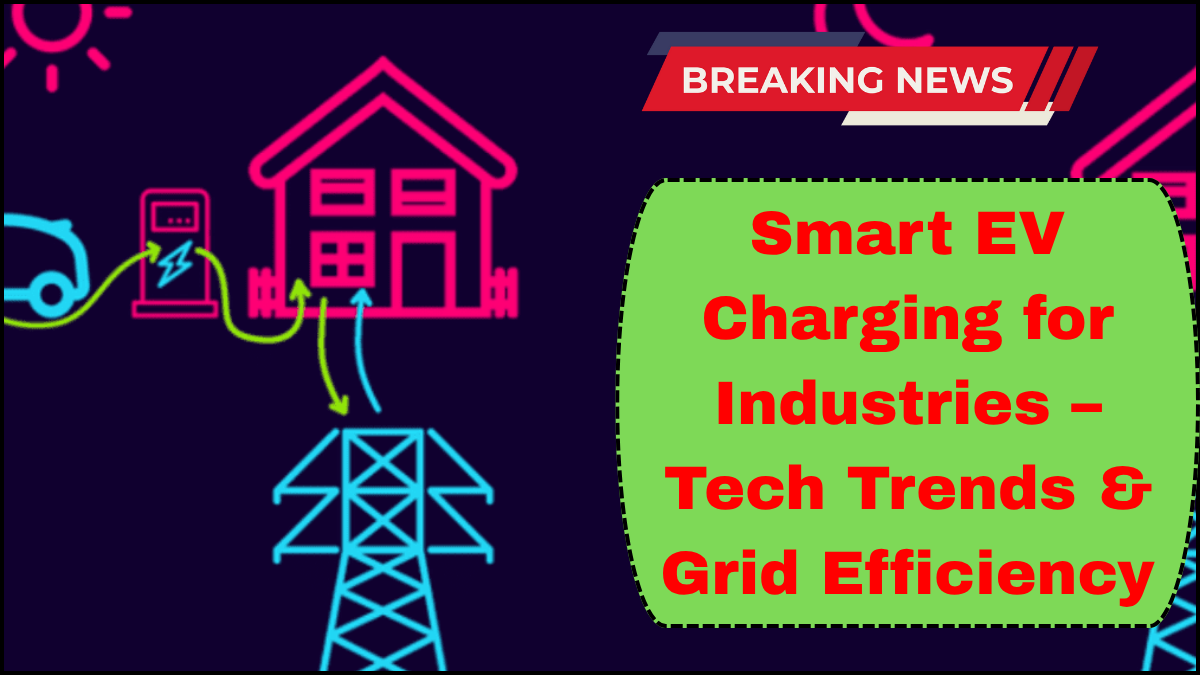As industries accelerate their transition to electric vehicles (EVs), the pressure to adopt Smart Charging Tech becomes more critical. Industrial fleets, logistics centers, and manufacturing hubs are now integrating smarter, more efficient EV infrastructure to align with sustainability goals, reduce operational costs, and ease the burden on the power grid.

This article dives into the emerging technologies shaping smart EV charging for industries and how these innovations enhance EV optimization while promoting grid stability.
The Rise of Industrial EV Adoption
The shift to electric fleets in sectors like manufacturing, mining, logistics, and utilities is no longer a future scenario—it’s already happening. As industrial operations become more automated and emissions regulations tighten, companies are phasing out internal combustion engines in favor of electric alternatives.
However, transitioning to EVs at scale introduces new challenges: managing energy demands, scheduling fleet usage, and avoiding peak-hour charging that can spike electricity costs.
That’s where Smart Charging Tech steps in.
What Is Smart Charging Tech?
Smart Charging Technology refers to a networked EV charging infrastructure that uses software-driven systems to control, optimize, and automate the charging process. These systems communicate with EVs, power grids, and facility management systems in real-time, enabling:
-
Load balancing across multiple chargers
-
Time-of-use energy cost savings
-
Integration with renewable energy sources
-
Predictive maintenance and analytics
In short, smart charging is about doing more with less—charging faster, cleaner, and cheaper without overloading infrastructure.
Key Tech Trends in Smart EV Charging for Industries
1. AI-Powered Load Management
Artificial intelligence plays a vital role in managing large-scale EV charging demands. AI-based platforms forecast energy usage, prioritize vehicles that need charging based on schedules, and adjust loads dynamically to prevent surges.
For example, a warehouse with 50 electric delivery trucks doesn’t need to charge all of them simultaneously. Smart charging software can stagger the load, ensuring only the necessary vehicles charge at optimal times.
2. Vehicle-to-Grid (V2G) Integration
V2G technology allows EVs to not only draw power but also return it to the grid. In an industrial setting, this means that idle EVs can become mobile energy storage units.
When power demand is high, these EVs can feed energy back into the grid or supply on-site operations—creating a more resilient and responsive energy ecosystem.
3. Renewable Energy Integration
Smart charging systems can sync with solar panels or wind turbines to prioritize clean energy when available. If your facility generates solar power during the day, EVs can be charged using that supply and stored energy can be saved for peak hours.
This not only reduces electricity bills but also significantly enhances EV optimization by utilizing the cleanest energy possible.
4. Cloud-Based Charging Platforms
Industrial operations often span multiple sites. Cloud-based smart charging platforms provide centralized visibility and control over all charging stations. This allows energy managers to monitor usage, run diagnostics, and implement updates remotely.
Real-time analytics also help improve forecasting and uncover inefficiencies in the charging process.
Grid Efficiency and Industrial Demand
A poorly managed EV fleet can place immense strain on local grids. Charging a fleet of electric forklifts or trucks all at once during peak hours leads to energy spikes that can result in grid instability or expensive demand charges.
Smart Charging Tech combats this by:
-
Shifting loads to off-peak hours
-
Utilizing stored renewable energy
-
Managing charging speed and duration based on real-time grid data
This two-way communication between charging systems and utilities ensures that energy usage remains balanced and predictable, helping prevent blackouts or costly upgrades.
Benefits of Smart Charging for Industrial Operations
-
Cost Savings: Avoid peak charges and benefit from time-of-use pricing.
-
Operational Continuity: Prevent downtime through predictive maintenance and automated scheduling.
-
Sustainability: Cut emissions by using renewable energy and optimizing charging.
-
Scalability: Easily expand infrastructure as your EV fleet grows.
-
Grid-Friendly: Reduce the risk of energy overloads and comply with demand-response programs.
Final Thoughts
The future of industrial electrification depends on more than just switching to electric vehicles—it depends on smart, scalable, and efficient charging infrastructure. Smart Charging Tech empowers industries to achieve full EV optimization, not only reducing operational costs but also playing a crucial role in building a more sustainable, resilient grid.
As these technologies evolve, the synergy between industrial operations and energy systems will become a cornerstone of modern infrastructure.
FAQs
Q1: What is the difference between standard and smart EV charging?
Smart EV charging uses real-time data, automation, and connectivity to optimize when and how vehicles are charged. Standard charging offers no such optimization, often leading to higher costs and grid strain.
Q2: Is smart EV charging cost-effective for small industrial fleets?
Yes. Even with smaller fleets, smart charging reduces electricity costs, improves uptime, and integrates with existing energy systems, making it a long-term cost saver.
Q3: How does smart charging help with sustainability goals?
It enables the use of renewable energy, reduces energy waste, and allows companies to track and reduce their carbon footprint more effectively.
Q4: Can existing industrial EV chargers be upgraded to smart systems?
Many legacy chargers can be retrofitted with smart controllers or integrated into a cloud-based management platform, though compatibility varies by manufacturer.
Q5: What’s needed to start implementing smart charging in an industrial setting?
A reliable internet connection, compatible charging hardware, and a smart charging platform. Collaborating with an energy consultant or EV infrastructure provider can fast-track the setup.
click here to learn more



